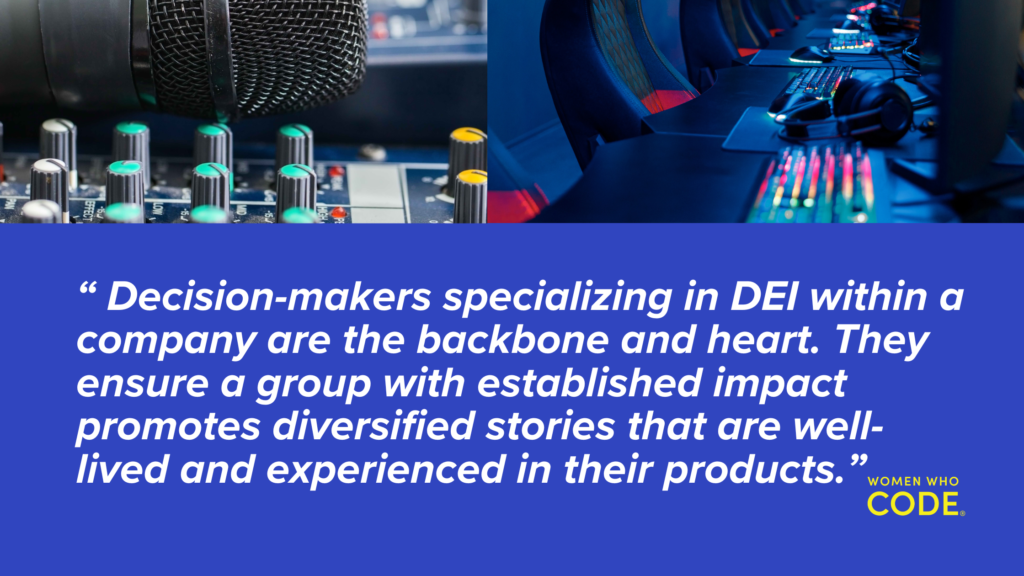Representation Matters: The Value of Inclusion in Entertainment Technology
Written by Liz Lopez

Imagine… you’re listening to the bone-shivering, skin-chilling lyrics of a song. You feel seen, enlightened, and empowered.
You just finished your go-to comfort TV show for the third time this year, and it hit just the same because no matter what, you see yourself in the main character every time.
You’re playing a video game, and you’re ecstatic to see that one of the player choices on the quest team looks like you. They have the same hair, figure, and even voice and tone, beholding the same wit as you.
The entertainment industry has the power to captivate you and make you feel validated and inspired, but the industry still isn’t doing enough to amplify diversified experiences. There are many examples in entertainment tech where we’ve collectively and individually felt seen – the live-action Little Mermaid featuring Halle Bailey, Macklemore’s 2012 song “Same Love,” or the range of facial structures, skin pigments, personality traits, life aspirations, and even vocal tones in The Sims since its original release in 2000. Even with these examples, there are many more instances where corporations have missed the mark on representation and inclusion.
It’s obvious why when you look at who’s strategizing stories in entertainment tech aimed at diverse audiences. According to research conducted at UCLA in 2020, 92% of CEOs and Chairs within studios and TV Networks are white, and a whopping 68% of them are men. Also, 84% of Senior Executives are white, and 60% are male.
The recent Hollywood strike that ended is a surefire example of inequalities occurring throughout entertainment. “In 2021-22, women comprised 39% of directors, writers, producers, executive producers, editors, and cinematographers working on independent films screening/streaming at high-profile film festivals in the U.S.,” according to SDSU’s Center for the Study of Women in Television and Film. Their report continues, “overall, women comprised 17% of composers.” It’s clear there are polarizing disparities of female technologists telling diverse stories in supporting roles in entertainment.
Corporations creating products that promote diversity should have a workforce that reflects those lived experiences, especially when it’s profiting off diversity. Hiring leadership that represents and prioritizes diversity enables a workforce of diverse women who are software engineers, video editors, senior producers, QA analysts, and composers who get paid to tell the story.
These decision-makers specializing in DEI within a company are the backbone and heart. LinkedIn Learning states: “76% of employees and job seekers said diversity was important when considering job offers. 60% of employees want to hear business leaders speak up on diversity issues. 80% of survey respondents said they want to work for a company that values DEI issues.” The world’s global job board and network polls are in, and employees have a substantial majority value for DEI initiatives and structure within the places they aspire to work for.
BuiltIn.com discusses how “Compared to individual decision makers, diverse teams make better decisions 66% of the time. Gender-diverse teams were found to make better business decisions 73% of the time, while teams including a range of ages and different geographic locations saw better decisions 87% of the time.”

There exists an undeniable opportunity for strengthening intentional representation and the influence that makes that happen in the most genuine ways possible. No matter your seat of placement, enable the power of entertainment tech to empower you.
If you found these data points interesting, feel free to explore their sources down below. You can also follow @ WomenInMusic on Instagram and join groups on Facebook and LinkedIn, such as @ Women In The Music Industry on LinkedIn or Women In Film And TV on Facebook, linked in the groups and profiles section below.
Resources:
- Entertainment industry executives are still predominately white males: study | The Hill.
- Musician demographics and statistics in the US
- SDSU – Center for the Study of Women in Television and Film: Research
- Why Is Diversity and Inclusion Important? Explore Key DEI Stats.
- 50 Diversity in the Workplace Statistics to Know in 2023 | Built In.
- Benefits of diversity, equity, and inclusion
Groups/Profiles: